Unit 8 It must belong to Carla Section A (Grammar Focus-4c )课件(共32张PPT)+内嵌视频
文档属性
| 名称 | Unit 8 It must belong to Carla Section A (Grammar Focus-4c )课件(共32张PPT)+内嵌视频 | 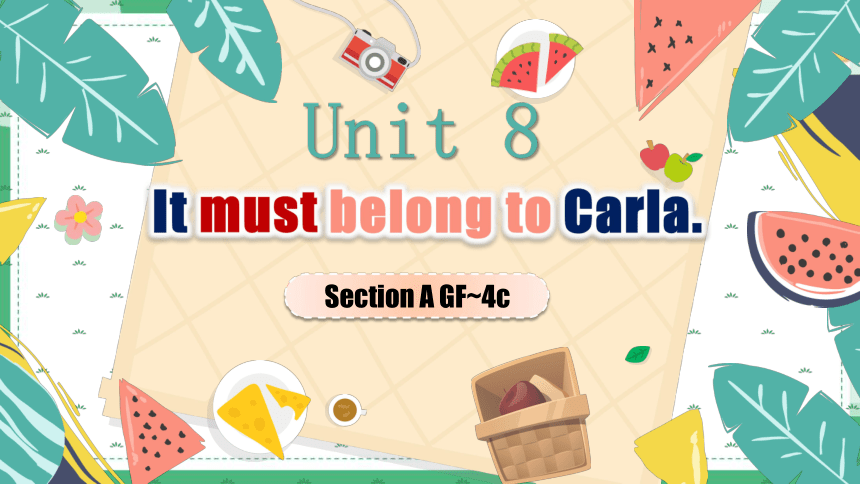 | |
| 格式 | pptx | ||
| 文件大小 | 74.9MB | ||
| 资源类型 | 教案 | ||
| 版本资源 | 人教新目标(Go for it)版 | ||
| 科目 | 英语 | ||
| 更新时间 | 2023-12-06 16:08:06 | ||
图片预览

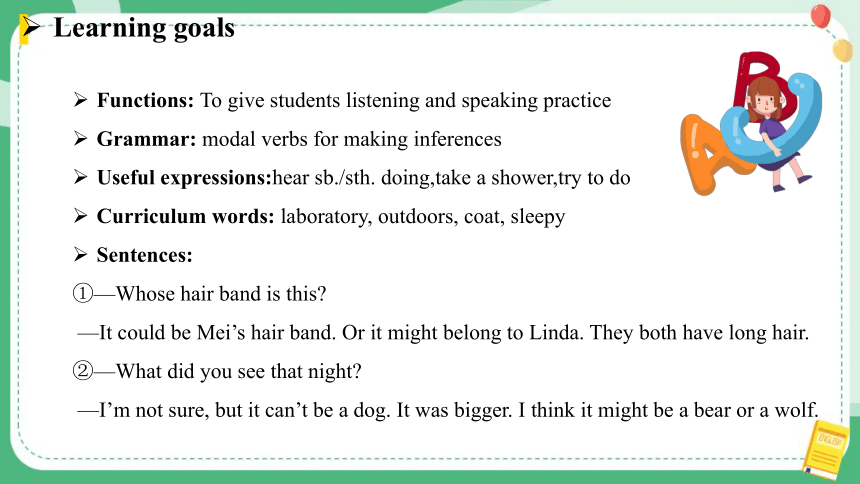
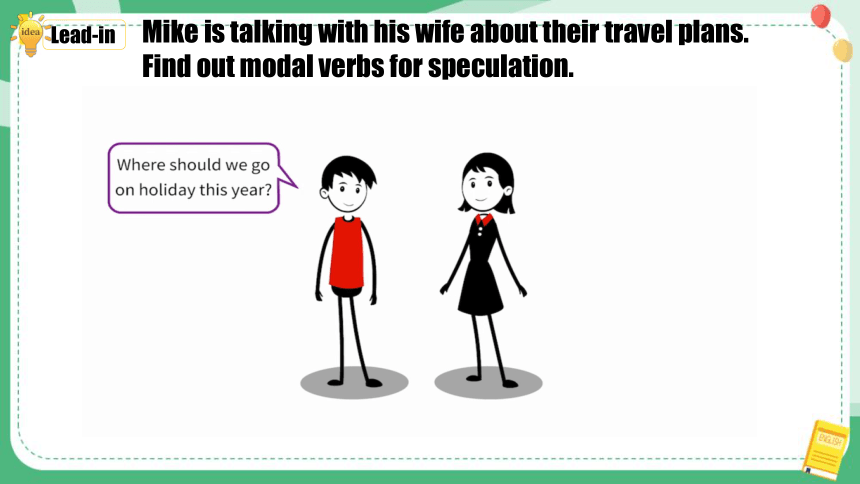
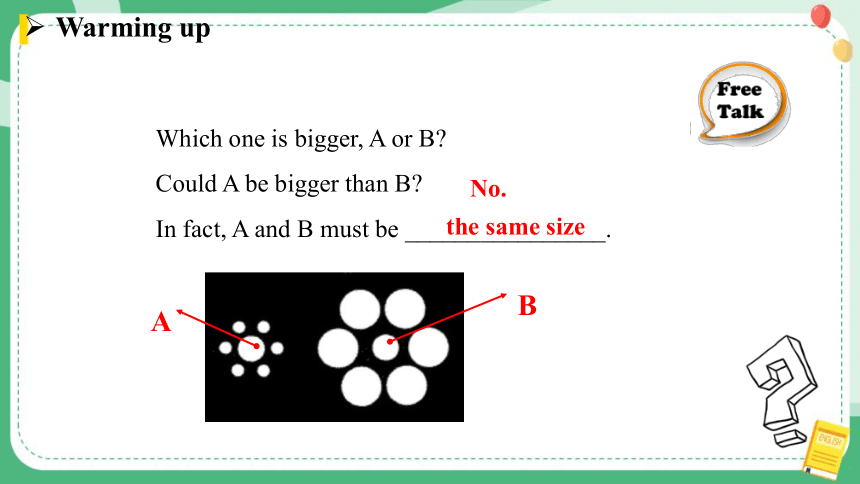
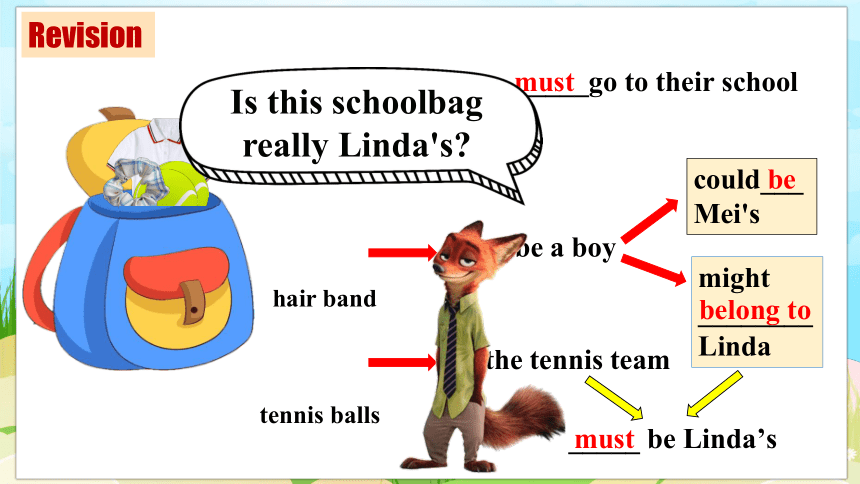
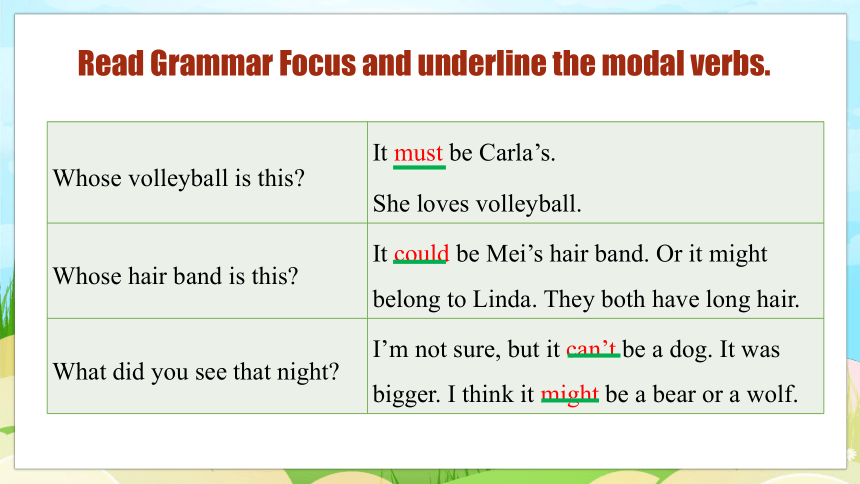

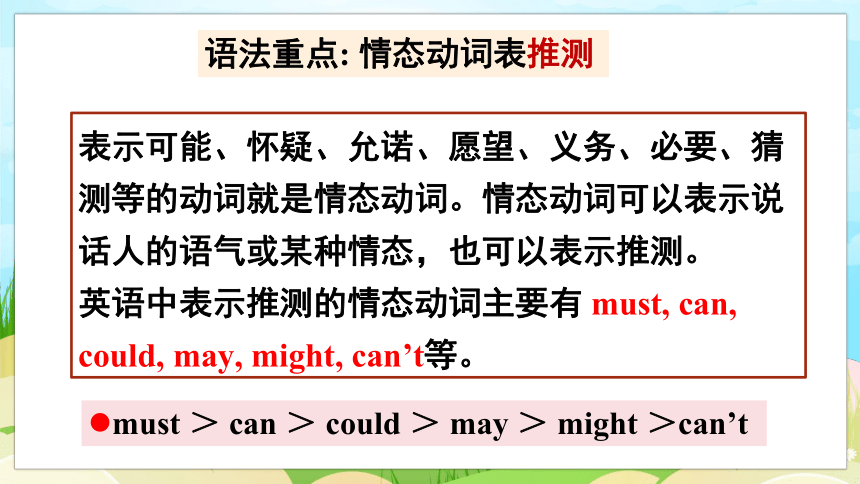
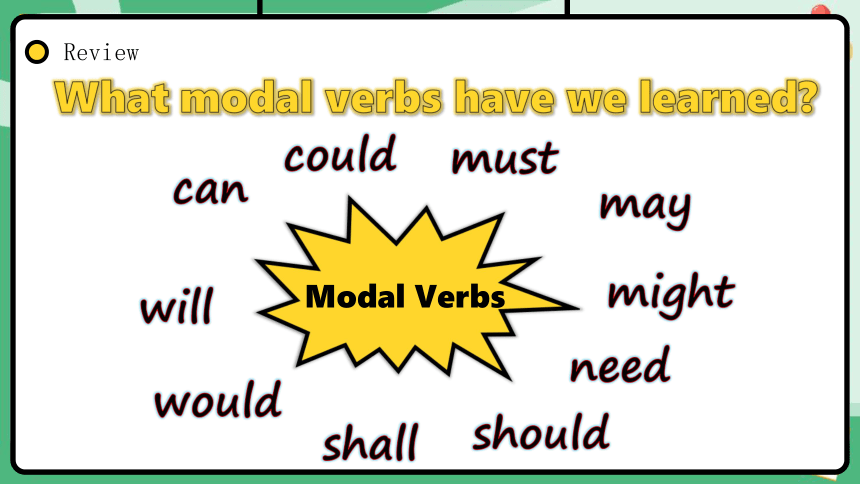
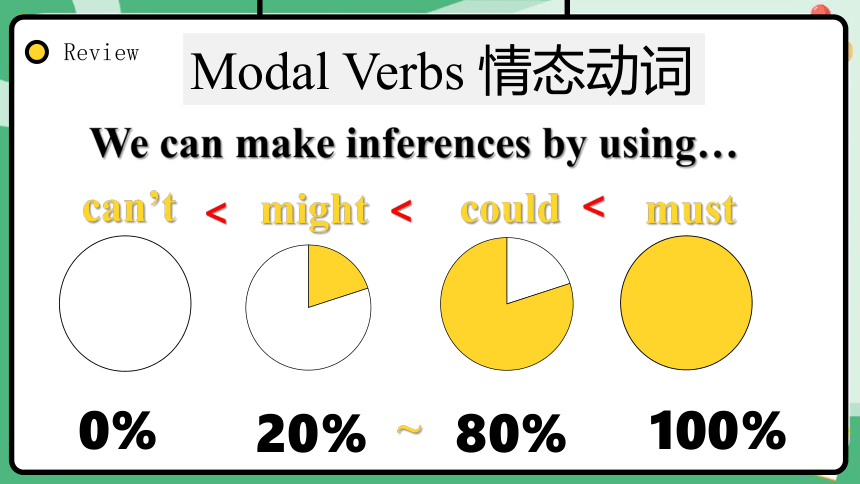
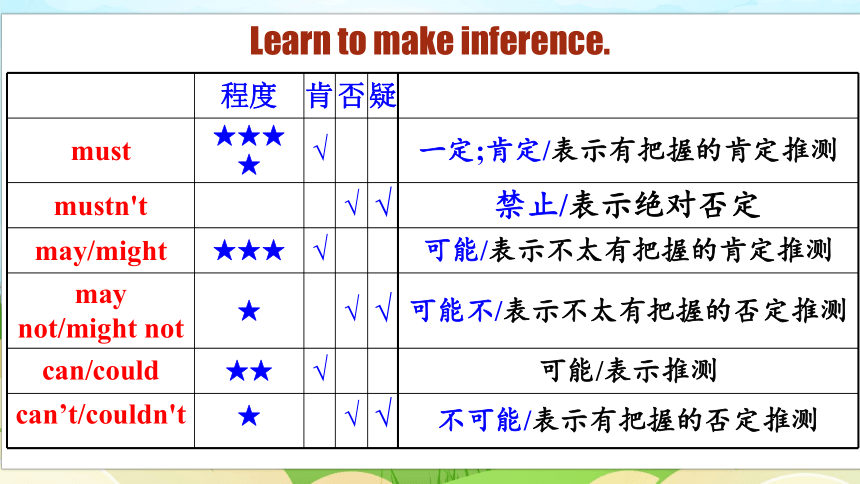
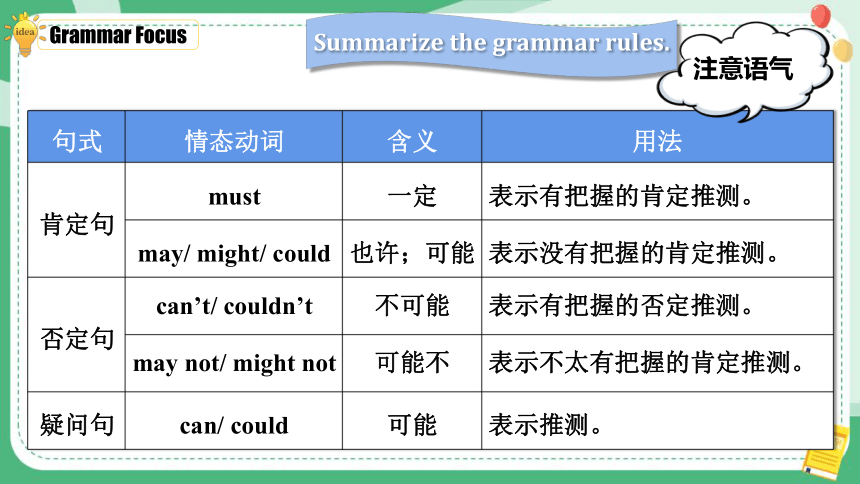
文档简介
(共32张PPT)
Unit 8
It must belong to Carla.
Section A GF~4c
Learning goals
Functions: To give students listening and speaking practice
Grammar: modal verbs for making inferences
Useful expressions:hear sb./sth. doing,take a shower,try to do
Curriculum words: laboratory, outdoors, coat, sleepy
Sentences:
①—Whose hair band is this
—It could be Mei’s hair band. Or it might belong to Linda. They both have long hair.
②—What did you see that night
—I’m not sure, but it can’t be a dog. It was bigger. I think it might be a bear or a wolf.
Mike is talking with his wife about their travel plans.
Find out modal verbs for speculation.
Lead-in
Which one is bigger, A or B
Could A be bigger than B
In fact, A and B must be ________________.
A
B
the same size
No.
Warming up
school T-shirts
hair band
______go to their school
must
____ be a boy
could___ Mei's
might
________
Linda
can't
be
belong to
tennis balls
on the tennis team
_____ be Linda’s
must
Revision
Is this schoolbag really Linda's
Whose volleyball is this It must be Carla’s.
She loves volleyball.
Whose hair band is this It could be Mei’s hair band. Or it might belong to Linda. They both have long hair.
What did you see that night I’m not sure, but it can’t be a dog. It was bigger. I think it might be a bear or a wolf.
Read Grammar Focus and underline the modal verbs.
It must be very expensive.
The people who do it must be very fit.
That might be fun.
It may be too challenging for us.
It could be dangerous.
It can't be that dangerous to go onsafari. So many people do it.
Look at these sentences.
情态动词
表推测
Lead-in
情态动词must,can,could,may和might均可表示推测,可以对过去、现在或将来的情况作出语气强弱不同的推测。
语法重点: 情态动词表推测
表示可能、怀疑、允诺、愿望、义务、必要、猜测等的动词就是情态动词。情态动词可以表示说话人的语气或某种情态,也可以表示推测。
英语中表示推测的情态动词主要有 must, can, could, may, might, can’t等。
must > can > could > may > might >can’t
Review
What modal verbs have we learned
shall
could
must
may
might
need
should
can
will
would
Modal Verbs
Review
can’t
might
could
must
We can make inferences by using…
0%
20%
80%
100%
~
<
<
<
Modal Verbs 情态动词
Learn to make inference.
程度 肯 否 疑
must ★★★★ √ 一定;肯定/表示有把握的肯定推测
mustn't √ √ 禁止/表示绝对否定
may/might ★★★ √ 可能/表示不太有把握的肯定推测
may not/might not ★ √ √ 可能不/表示不太有把握的否定推测
can/could ★★ √ 可能/表示推测
can’t/couldn't ★ √ √
不可能/表示有把握的否定推测
Summarize the grammar rules.
Grammar Focus
句式 情态动词 含义 用法
肯定句 must 一定 表示有把握的肯定推测。
may/ might/ could 也许;可能 表示没有把握的肯定推测。
否定句 can’t/ couldn’t 不可能 表示有把握的否定推测。
may not/ might not 可能不 表示不太有把握的肯定推测。
疑问句 can/ could 可能 表示推测。
注意语气
Presentation
表示可能性最大的肯定推测,意思是“一定”。只能用于肯定句。如果要表示“一定不”,应该用can’t。
must
can / could
can表示推测时,一般用于否定句或疑问句。can在疑问句中意思是“会,可能”。
could 用于表示某事有可能发生或可能是事实。
may, might表示推测时,意思是“可能”,“也许”。might不是表示过去时态,语气更委婉,可能性更小。may,might表推测时,可用于否定句,但不用于疑问句。
may/ might
Meanings
情态动词表示推测
We use __________ when we are sure that something is ture because there’s very strong evidence(证据).
We use ________________ when we think something is possible,but we are not sure.
We use ____________ when we feel sure something is not ture.
100%
50%
0%
must
could/might
can’t
情态动词表示推测可以分为以下几种情况:
(1)情态动词+ do
此结构表示对现在或将来情况的推测和判断。
eg: —Do you know where she is now
—I think she might travel in Beijing.
(2)情态动词+ be doing
此结构表示对现在或将来正在进行的情况的推测和判断。
eg:At this moment, my father can’t be working in the office.
Grammar
(3)情态动词+ have done
此结构表示对过去情况的推测和判断。
eg:The road is wet. It must have rained last night.
(4)情态动词+ have been doing
此结构表示对过去正在进行的情况的推测和判断。
eg:Your mother must have been looking for you at that moment.
Grammar
情态动词表示推测可以分为以下几种情况:
1.情态动词+ do
此结构表示对现在或将来情况的推测和判断
—Do you know where she is now
—I think she might travel in Beijing.
2.情态动词+ be doing
此结构表示对现在或将来正在进行的情况的推测和判断。
At this moment, my father can’t be working in the office.
拓展
Grammar Focus
1.情态动词+ do:
对现在或将来情况的推测。
He must be your uncle.
Don’t play with the knife. You could cut yourself.
I think Linda might travel in Beijing.
拓展
Grammar Focus
2.情态动词+ be + 动词-ing形式:
对此时此刻正在进行的情况进行推测。
注意时态
There’s a lot of noise from next door.
They must be having a party.
Mr. Wang is not in his apartment.
He might be working at factory.
At this moment, my father can’t be working in the office.
情态动词表示推测可以分为以下几种情况:
3.情态动词+ have done
此结构表示对过去情况的推测和判断。
The road is wet. It must have rained last night.
4.情态动词+ have been doing
此结构表示对过去正在进行的情况的推测和判断。
Your mother must have been looking for you at that moment.
1. 情态动词不能表示正在发生或已经发生的事情,
只表示期待或估计某事的发生。
2. 情态动词ought和have,后面只能接带to的不定式。
3.情态动词没有人称、数的变化,即情态动词第三人称单数
不加s。
4.情态动词没有非谓语形式,即没有不定式、分词等形式。
语法特征
Choose the best way to complete each sentence using the words in brackets.
1. A: Where’s Jean
B: I’m not sure. She __________ (is/might be/must be) in the laboratory.
might be
n. 实验室
2. A: Everyone is going to the pool after school.
B: Really It ________ (must be / can’t be /could be ) hot outdoors.
must be
4a
3. A: That’s the phone.
B: Hmm. I wonder who it __________ (must be / could be / should be).
could be
4. A: I wonder if these are Jim’s glasses.
B: They _________ (can’t be / might be / could be) his. He doesn’t wear glasses.
can’t be
5. A: I hear water running in the bathroom.
B: It ________________ (could be / must be / can’t be) Carla. She was thinking of taking a shower.
could be / must be
Complete these responses.
1. A: Many people are wearing coats.
B: The weather must be ________________________.
2. A: Sally has been coughing a lot.
B: She might be ______________________________.
ill/having a sore throat
getting colder/ cold outside
wear coats穿外套
have/has been doing sth.现在完成进行时,“一直做......”
Grammar
4b
3. A: This restaurant is always very crowded.
B: The food __________________________________.
4. A: Whenever I try to read this book, I feel sleepy.
B: It can’t ____________________________________.
must be delicious
be that boring
feel sleepy感觉瞌睡的
asleep adj.睡着的
“每当”引导时间状语从句
try to do sth.尽力做某事
Grammar
用情态动词的正确形式填空
After a long walk, you ______ feel tired.
The man ______ be Mr. Li. He went to HK yesterday.
My mom __________________ go to visit grandpa. I am not sure of it.
The notebook ______ be Mary’s because it has her name on it.
must
can’t
may/might/ could
must
Look at this picture of a room. How much can you tell about the person who lives here Is it a boy or a girl
What are his/her hobbies Discuss your ideas with a partner.
Presentation
4c
A: It could be a girl’s room because it’s very tidy.
B: I guess so. But it might be a boy’s room because the clothes look like boys’ clothes.
A: It could be a girl’s room because it’s very tidy.
B: I guess so. But it might be a boy’s room because the clothes look like boys’ clothes.
Look at this picture of a room. How much can you tell about the person who lives here Is it a boy or a girl What are his / her hobbies Discuss your ideas with a partner.
Grammar
4c
语法小知识——情态动词表推测
表推测的意义和用法:
句式 情态动词 用法 意义 例句
肯定句 must 表示有把握的肯定推测 一定; 肯定 Miller must be very tired after a long journey.
could/may/ might 其肯定程度逐渐减弱,表示把握不大的推测 可能
It might rain this afternoon.
否定句 can’t 表示有把握的否定推测 不可能 Amy can’t be at school. It’s Sunday today.
疑问句 can/ could 表示推测 可能 Can Peter still be alive after so many years
I. Close your book and try to recite Grammar Focus.
1. 这是谁的排球 _______ __________ is this
这一定是卡拉的。她热爱排球运动。
It ______ be ________. She loves volleyball.
must Carla’s
2. 这是谁的发带? ______ ____ ____ is this
它可能是梅的发带。或者可能属于琳 达。她们两人都是长头发。
It ______ be Mei’s hair band. Or it ______ belong to Linda. They _____ have long hair.
could
might
both
Whose hair band
Whose volleyball
3. 那晚你看见了什么? _____ did you see that night
我不确定,但肯定不可能是狗。它更大。我想也许是一头熊或一匹狼。
I’m ___ ____, but it _____ ___ a dog.
It was bigger. I think it _____ ___ a bear or a wolf.
What
not sure
can’t be
might be
II.单项选择
1. —Whose T - shirt is this —It ___ be John’s. It’s ____small.
A. can’t; much too B. can’t; too much
C. mustn’t; much too D. mustn’t; too much
2. — Where are you going this month
— We______ go to Xiamen, but we're not sure.
A. needn’t B. must C. might D. mustn’t
3. — Have you decided where to go for your summer vacation
— Not yet. We _____ go to Qingdao. It's a good place for vacation.
A. may B. need C. must D. can
4. — Must I water the flowers now, mum
— No, you ______. You _____ do it later.
A.mustn’t; must B.mustn’t; may C.needn’t; may D.needn’t; must
A
C
A
C
Level B:
Remember the grammar points we’ve learnt today.
Level A:
Make up sentences with must/could/might/can’t to make inferences according to 4c.
Homework
Unit 8
It must belong to Carla.
Section A GF~4c
Learning goals
Functions: To give students listening and speaking practice
Grammar: modal verbs for making inferences
Useful expressions:hear sb./sth. doing,take a shower,try to do
Curriculum words: laboratory, outdoors, coat, sleepy
Sentences:
①—Whose hair band is this
—It could be Mei’s hair band. Or it might belong to Linda. They both have long hair.
②—What did you see that night
—I’m not sure, but it can’t be a dog. It was bigger. I think it might be a bear or a wolf.
Mike is talking with his wife about their travel plans.
Find out modal verbs for speculation.
Lead-in
Which one is bigger, A or B
Could A be bigger than B
In fact, A and B must be ________________.
A
B
the same size
No.
Warming up
school T-shirts
hair band
______go to their school
must
____ be a boy
could___ Mei's
might
________
Linda
can't
be
belong to
tennis balls
on the tennis team
_____ be Linda’s
must
Revision
Is this schoolbag really Linda's
Whose volleyball is this It must be Carla’s.
She loves volleyball.
Whose hair band is this It could be Mei’s hair band. Or it might belong to Linda. They both have long hair.
What did you see that night I’m not sure, but it can’t be a dog. It was bigger. I think it might be a bear or a wolf.
Read Grammar Focus and underline the modal verbs.
It must be very expensive.
The people who do it must be very fit.
That might be fun.
It may be too challenging for us.
It could be dangerous.
It can't be that dangerous to go onsafari. So many people do it.
Look at these sentences.
情态动词
表推测
Lead-in
情态动词must,can,could,may和might均可表示推测,可以对过去、现在或将来的情况作出语气强弱不同的推测。
语法重点: 情态动词表推测
表示可能、怀疑、允诺、愿望、义务、必要、猜测等的动词就是情态动词。情态动词可以表示说话人的语气或某种情态,也可以表示推测。
英语中表示推测的情态动词主要有 must, can, could, may, might, can’t等。
must > can > could > may > might >can’t
Review
What modal verbs have we learned
shall
could
must
may
might
need
should
can
will
would
Modal Verbs
Review
can’t
might
could
must
We can make inferences by using…
0%
20%
80%
100%
~
<
<
<
Modal Verbs 情态动词
Learn to make inference.
程度 肯 否 疑
must ★★★★ √ 一定;肯定/表示有把握的肯定推测
mustn't √ √ 禁止/表示绝对否定
may/might ★★★ √ 可能/表示不太有把握的肯定推测
may not/might not ★ √ √ 可能不/表示不太有把握的否定推测
can/could ★★ √ 可能/表示推测
can’t/couldn't ★ √ √
不可能/表示有把握的否定推测
Summarize the grammar rules.
Grammar Focus
句式 情态动词 含义 用法
肯定句 must 一定 表示有把握的肯定推测。
may/ might/ could 也许;可能 表示没有把握的肯定推测。
否定句 can’t/ couldn’t 不可能 表示有把握的否定推测。
may not/ might not 可能不 表示不太有把握的肯定推测。
疑问句 can/ could 可能 表示推测。
注意语气
Presentation
表示可能性最大的肯定推测,意思是“一定”。只能用于肯定句。如果要表示“一定不”,应该用can’t。
must
can / could
can表示推测时,一般用于否定句或疑问句。can在疑问句中意思是“会,可能”。
could 用于表示某事有可能发生或可能是事实。
may, might表示推测时,意思是“可能”,“也许”。might不是表示过去时态,语气更委婉,可能性更小。may,might表推测时,可用于否定句,但不用于疑问句。
may/ might
Meanings
情态动词表示推测
We use __________ when we are sure that something is ture because there’s very strong evidence(证据).
We use ________________ when we think something is possible,but we are not sure.
We use ____________ when we feel sure something is not ture.
100%
50%
0%
must
could/might
can’t
情态动词表示推测可以分为以下几种情况:
(1)情态动词+ do
此结构表示对现在或将来情况的推测和判断。
eg: —Do you know where she is now
—I think she might travel in Beijing.
(2)情态动词+ be doing
此结构表示对现在或将来正在进行的情况的推测和判断。
eg:At this moment, my father can’t be working in the office.
Grammar
(3)情态动词+ have done
此结构表示对过去情况的推测和判断。
eg:The road is wet. It must have rained last night.
(4)情态动词+ have been doing
此结构表示对过去正在进行的情况的推测和判断。
eg:Your mother must have been looking for you at that moment.
Grammar
情态动词表示推测可以分为以下几种情况:
1.情态动词+ do
此结构表示对现在或将来情况的推测和判断
—Do you know where she is now
—I think she might travel in Beijing.
2.情态动词+ be doing
此结构表示对现在或将来正在进行的情况的推测和判断。
At this moment, my father can’t be working in the office.
拓展
Grammar Focus
1.情态动词+ do:
对现在或将来情况的推测。
He must be your uncle.
Don’t play with the knife. You could cut yourself.
I think Linda might travel in Beijing.
拓展
Grammar Focus
2.情态动词+ be + 动词-ing形式:
对此时此刻正在进行的情况进行推测。
注意时态
There’s a lot of noise from next door.
They must be having a party.
Mr. Wang is not in his apartment.
He might be working at factory.
At this moment, my father can’t be working in the office.
情态动词表示推测可以分为以下几种情况:
3.情态动词+ have done
此结构表示对过去情况的推测和判断。
The road is wet. It must have rained last night.
4.情态动词+ have been doing
此结构表示对过去正在进行的情况的推测和判断。
Your mother must have been looking for you at that moment.
1. 情态动词不能表示正在发生或已经发生的事情,
只表示期待或估计某事的发生。
2. 情态动词ought和have,后面只能接带to的不定式。
3.情态动词没有人称、数的变化,即情态动词第三人称单数
不加s。
4.情态动词没有非谓语形式,即没有不定式、分词等形式。
语法特征
Choose the best way to complete each sentence using the words in brackets.
1. A: Where’s Jean
B: I’m not sure. She __________ (is/might be/must be) in the laboratory.
might be
n. 实验室
2. A: Everyone is going to the pool after school.
B: Really It ________ (must be / can’t be /could be ) hot outdoors.
must be
4a
3. A: That’s the phone.
B: Hmm. I wonder who it __________ (must be / could be / should be).
could be
4. A: I wonder if these are Jim’s glasses.
B: They _________ (can’t be / might be / could be) his. He doesn’t wear glasses.
can’t be
5. A: I hear water running in the bathroom.
B: It ________________ (could be / must be / can’t be) Carla. She was thinking of taking a shower.
could be / must be
Complete these responses.
1. A: Many people are wearing coats.
B: The weather must be ________________________.
2. A: Sally has been coughing a lot.
B: She might be ______________________________.
ill/having a sore throat
getting colder/ cold outside
wear coats穿外套
have/has been doing sth.现在完成进行时,“一直做......”
Grammar
4b
3. A: This restaurant is always very crowded.
B: The food __________________________________.
4. A: Whenever I try to read this book, I feel sleepy.
B: It can’t ____________________________________.
must be delicious
be that boring
feel sleepy感觉瞌睡的
asleep adj.睡着的
“每当”引导时间状语从句
try to do sth.尽力做某事
Grammar
用情态动词的正确形式填空
After a long walk, you ______ feel tired.
The man ______ be Mr. Li. He went to HK yesterday.
My mom __________________ go to visit grandpa. I am not sure of it.
The notebook ______ be Mary’s because it has her name on it.
must
can’t
may/might/ could
must
Look at this picture of a room. How much can you tell about the person who lives here Is it a boy or a girl
What are his/her hobbies Discuss your ideas with a partner.
Presentation
4c
A: It could be a girl’s room because it’s very tidy.
B: I guess so. But it might be a boy’s room because the clothes look like boys’ clothes.
A: It could be a girl’s room because it’s very tidy.
B: I guess so. But it might be a boy’s room because the clothes look like boys’ clothes.
Look at this picture of a room. How much can you tell about the person who lives here Is it a boy or a girl What are his / her hobbies Discuss your ideas with a partner.
Grammar
4c
语法小知识——情态动词表推测
表推测的意义和用法:
句式 情态动词 用法 意义 例句
肯定句 must 表示有把握的肯定推测 一定; 肯定 Miller must be very tired after a long journey.
could/may/ might 其肯定程度逐渐减弱,表示把握不大的推测 可能
It might rain this afternoon.
否定句 can’t 表示有把握的否定推测 不可能 Amy can’t be at school. It’s Sunday today.
疑问句 can/ could 表示推测 可能 Can Peter still be alive after so many years
I. Close your book and try to recite Grammar Focus.
1. 这是谁的排球 _______ __________ is this
这一定是卡拉的。她热爱排球运动。
It ______ be ________. She loves volleyball.
must Carla’s
2. 这是谁的发带? ______ ____ ____ is this
它可能是梅的发带。或者可能属于琳 达。她们两人都是长头发。
It ______ be Mei’s hair band. Or it ______ belong to Linda. They _____ have long hair.
could
might
both
Whose hair band
Whose volleyball
3. 那晚你看见了什么? _____ did you see that night
我不确定,但肯定不可能是狗。它更大。我想也许是一头熊或一匹狼。
I’m ___ ____, but it _____ ___ a dog.
It was bigger. I think it _____ ___ a bear or a wolf.
What
not sure
can’t be
might be
II.单项选择
1. —Whose T - shirt is this —It ___ be John’s. It’s ____small.
A. can’t; much too B. can’t; too much
C. mustn’t; much too D. mustn’t; too much
2. — Where are you going this month
— We______ go to Xiamen, but we're not sure.
A. needn’t B. must C. might D. mustn’t
3. — Have you decided where to go for your summer vacation
— Not yet. We _____ go to Qingdao. It's a good place for vacation.
A. may B. need C. must D. can
4. — Must I water the flowers now, mum
— No, you ______. You _____ do it later.
A.mustn’t; must B.mustn’t; may C.needn’t; may D.needn’t; must
A
C
A
C
Level B:
Remember the grammar points we’ve learnt today.
Level A:
Make up sentences with must/could/might/can’t to make inferences according to 4c.
Homework
同课章节目录
- Unit 1 How can we become good learners.
- Section A
- Section B
- Unit 2 I think that mooncakes are delicious!
- Section A
- Section B
- Unit 3 Could you please tell me where the restroom
- Section A
- Section B
- Unit 4 I used to be afraid of the dark.
- Section A
- Section B
- Unit 5 What are the shirts made of?
- Section A
- Section B
- Review of Units 1-5
- Unit 6 When was it invented?
- Section A
- Section B
- Unit 7 Teenagers should be allowed to choose their
- Section A
- Section B
- Unit 8 It must belong to Carla.
- Section A
- Section B
- Unit 9 I like music that I can dance to.
- Section A
- Section B
- Unit 10 You're supposed to shake hands.
- Section A
- Section B
- Review of Units 6-10
- Unit 11 Sad movies make me cry.
- Section A
- Section B
- Unit 12 Life is full of the unexpected
- Section A
- Section B
- Unit 13 We're trying to save the earth!
- Section A
- Section B
- Unit 14 I remember meeting all of you in Grade 7.
- Section A
- Section B
- Review of Units 11-14
